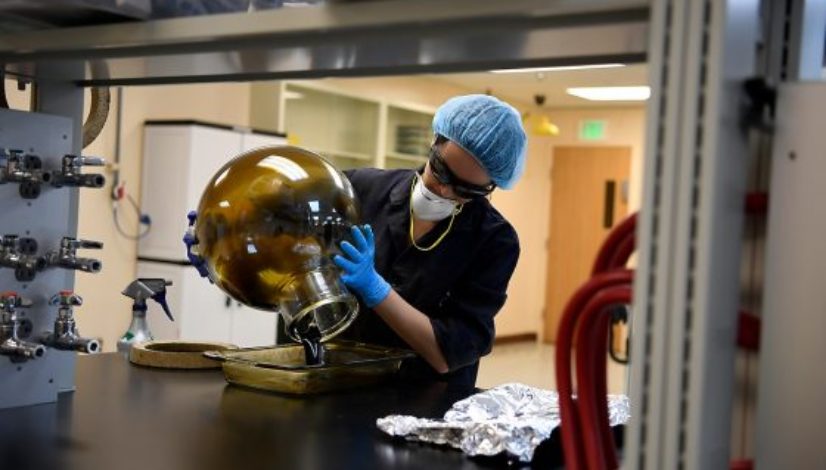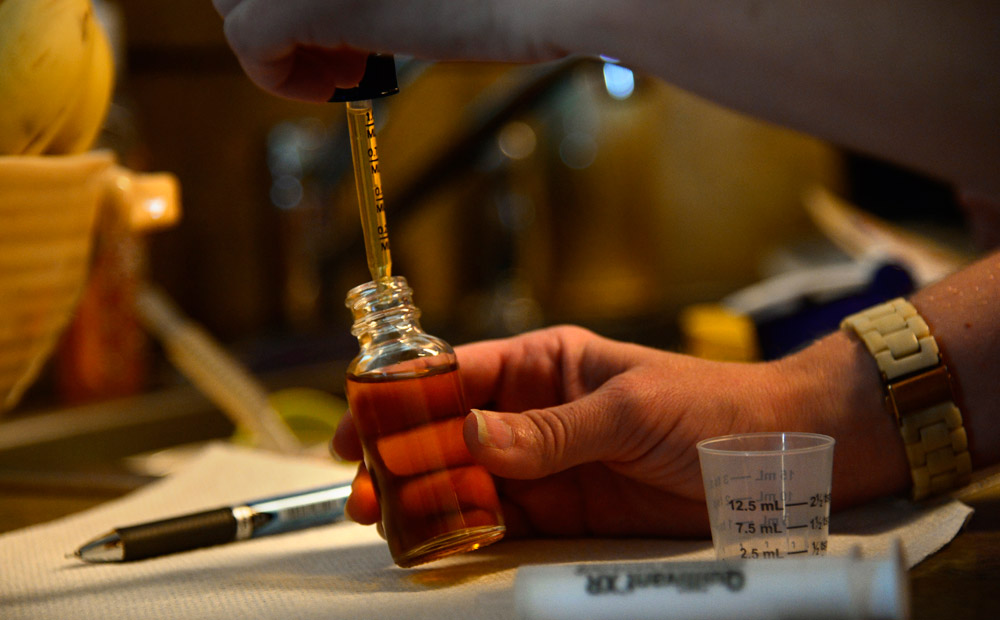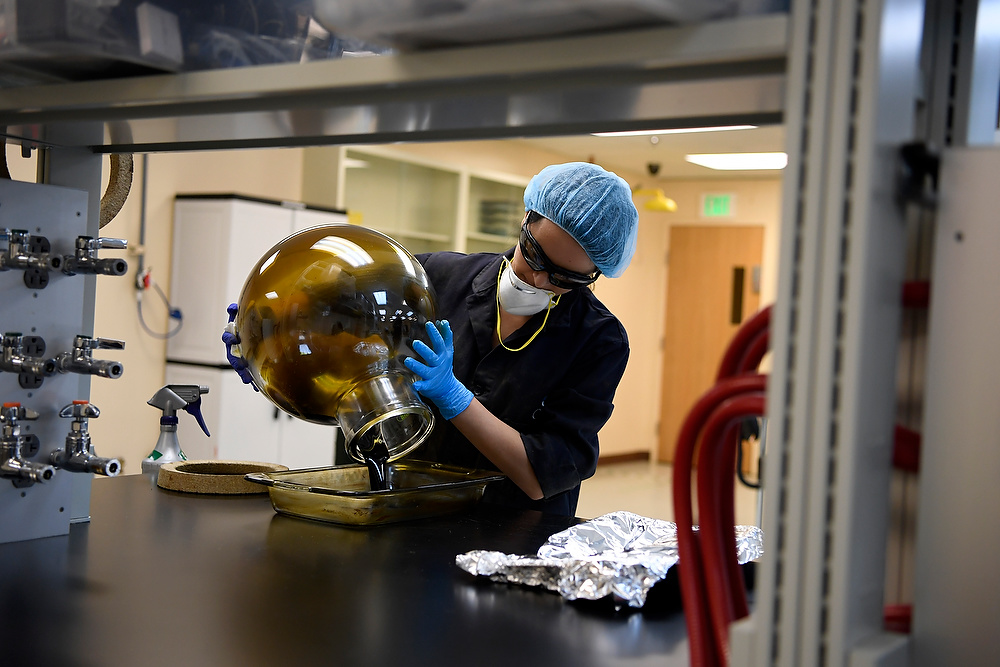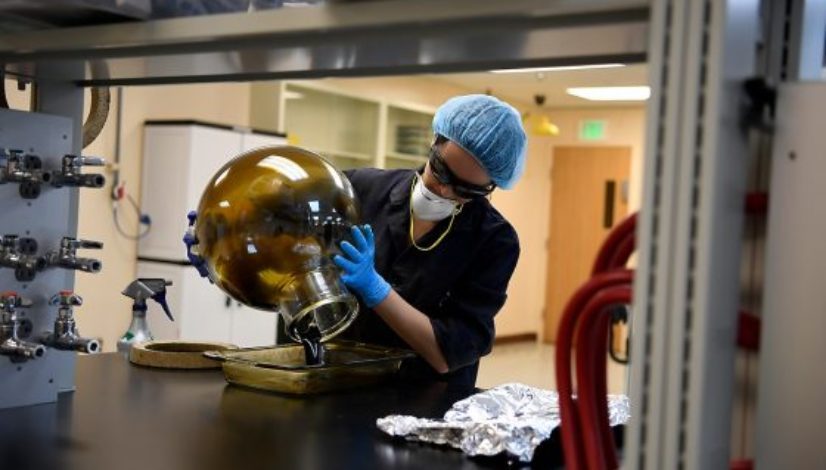Race for CBD medication breakthrough: Is pharma firm’s boon the hemp industry’s doom?

Published: Oct 6, 2017, 8:16 am • Updated: Oct 6, 2017, 8:22 am
By Alicia Wallace, The Cannabist Staff
Cannabidiol is a non-psychoactive cannabis compound touted for its medicinal promise — but marijuana- and hemp-derived extracts rich in CBD and low in intoxicating THC are facing a future yet to be determined.
The Cannabist’s special report “CBD, TBD” explores the issues with CBD — federal-state conflicts, national drug policy, pioneering research efforts and the paths toward the compound’s full legalization. This is the sixth installment in an ongoing series. Coming soon: A look at CBD’s path forward with hemp products.
This time next year, an investigational drug hailed as a breakthrough in the science of cannabidiol could be prescribed to children suffering from treatment-resistant epilepsy.
The prospect of its success, however, has caused some unease in the American hemp industry.
London-based GW Pharmaceuticals plc is steering its proprietary Epidiolex oral solution through the U.S. Food and Drug Administration’s approval pipeline.
Unlike other FDA-approved drugs that emulate the properties of THC, the psychoactive component of cannabis, Epidiolex (eh-pih-DYE-uh-lehx) utilizes another of the plant’s compounds: non-psychoactive cannabidiol. GW’s pharmaceutical formulation of purified CBD is targeted for treating rare, early onset seizure disorders including Dravet and Lennox-Gastaut syndromes, as well as Tuberous Sclerosis Complex and Infantile Spasms.
The company is expected to wrap up its New Drug Application to the FDA in the coming weeks; the federal agency could conduct its Good Manufacturing Practices (GMP) inspection by June.
If the FDA were to give its blessing to that application, Epidiolex could be readied for commercial sale on the prescription drug market by this time next year, GW officials told The Cannabist.
Cannabis advocates and purveyors of hemp-derived, CBD-rich extracts fear FDA approval of Epidiolex could lead to a pharmaceutical commandeering of promising cannabis compounds.
The company and some prominent members of the medical community, however, trumpet the attempt to harness CBD’s potential and package it into a medicine that conveys the safety, consistency and clarity that FDA approval affords.
“I can’t tell you how happy I was to see those three letters (GMP) in relation to cannabidiol,” Dr. Amy R. Brooks-Kayal, chief of pediatric neurology at Children’s Hospital Colorado, said earlier this year.
Special Report: CBD, TBD
Part I – Forbidden medicine: Caught between a doctor’s CBD advice and federal laws
Part II – How advocates are inspiring congressional action on CBD legalization
Part III – With DEA digging in its heels on “marijuana extracts,” legality of CBD oil on trial in federal courts
Part IV – CBD research is going to the dogs in quest to legitimize pet products
Part V – CBD on the international stage: WHO committee delving into science, control status of cannabis compound
Subscribe to our newsletter here.
Watch The Cannabist Show.
She was speaking in Denver at the annual meeting of the Teratology Society, which focuses on birth defects and pediatric health issues. During a symposium on Marijuana and Child Development, Brooks-Kayal spoke to the topic of cannabinoids for the treatment of pediatric epilepsy.
She described how Children’s Hospital Colorado saw an influx of patients whose parents packed up and moved to Colorado for the promise of CBD oil. In some cases, the parents stopped administering the other prescribed medications in favor of solely trying an array of dosings of CBD-rich extracts.
Some of those children would end up in the intensive care unit, Brooks-Kayal said.
Children’s Hospital Colorado does not prescribe or recommend medical cannabis products; however, Brooks-Kayal implores parents to let doctors know if they’ve given their child CBD or another form of medical cannabis — and to not stop the other medications cold-turkey.
GW’s efforts might not be the end-all, be-all solution for these hard-to-treat epilepsy conditions, but to have products put through rigorous testing, trials and regulations are steps in the right direction, Brooks-Kayal said.
GW expressed confidence that CBD is medicine and that the pharmaceutical approval was the appropriate path, despite the fact that extracts rich in the compound are already widely available in dispensaries — and online — in states that have legalized forms of medical cannabis.
“I think physicians, and I think patients, prefer to have a drug that’s been through that very stringent process,” said Steve Schultz, GW’s vice president of investor relations.
Accompanying the first-to-market designation, the hallmarks of the FDA approval process — potential for insurance coverage, directions on dosing, information about drug interactions, quality assurance, and other checks and balances — are important differentiators for GW as the company sets off to carve a niche for itself in cannabinoid drug development, Schultz said.
“You don’t ever get that kind of instruction with a dispensary-based product,” he said.
 A dose of Colorado-made cannabidiol oil is measured by a parent preparing to give CBD oil to her child as part of a regimented treatment for seizures in July 2014. (Joe Amon, Denver Post file)
A dose of Colorado-made cannabidiol oil is measured by a parent preparing to give CBD oil to her child as part of a regimented treatment for seizures in July 2014. (Joe Amon, Denver Post file)
Uncertainty breeds contingency plans
GW Pharmaceuticals’ advancement of Epidiolex is being closely watched by America’s cottage CBD industry.
Some producers are cautiously optimistic, taking the proverbial wait-and-see approach, while others have begun taking precautions such as changing labels and branding to highlight their products as “whole plant hemp extracts” as opposed to “CBD oil.”
Executives at GB Sciences Inc., a Las Vegas firm aiming to develop and patent several pharmaceutical-grade cannabinoid therapies, have extensively evaluated the potential regulatory issues that Epidiolex could raise, said Andrea L. Small-Howard, the company’s chief science officer.
In the event Epidiolex is approved, Small-Howard anticipates the FDA pathway to widen for the creation and testing of novel CBD formulations. At the same time, it would significantly disrupt the market for CBD products sold in dispensaries or online under state-regulated cannabis regimes, she said.
“These (state marijuana) programs are already in violation of federal law, therefore, an Epidiolex approval may push the issue of who has jurisdiction over pharmaceuticals, when CBD becomes an FDA-approved pharmaceutical ingredient,” Small-Howard said.
Others argue that consumers should have access to CBD products outside of the prescription-drug realm.
“All the products out there are special. One will work for one person, one won’t,” said Joel Stanley, chief executive officer of CW Hemp, the Denver-based company that rose to prominence after a CNN special on medical marijuana refugees and “Charlotte’s Web” CBD-rich oil.
Alternatively, siloing off CBD and other cannabinoids as pharmaceutical-only would limit the types of products available and result in them becoming more expensive, Stanley said.
There is still much to be learned about medical applications for CBD and other cannabinoids.
“It’s such a unique plant with unique abilities. I think we’re just scratching the surface on it,” said Gabriel Ettenson, general manager for Broomfield-based Elixinol, a manufacturer of CBD oils and hemp products.
Ettenson isn’t losing any sleep over GW and what may come from Epidiolex coming to market.
“There really isn’t any significant fear that I have about what may happen if GW gets approval,” he said.
 Team lead Vanessa Cantu of pours an extract of hemp into a pan before putting it into a vacuum oven, which eliminates the last traces of solvents used in processing plant material into an extract oil form at CW Hemp’s facility in Colorado on April 21, 2016. (AAron Ontiveroz, The Denver Post)
Team lead Vanessa Cantu of pours an extract of hemp into a pan before putting it into a vacuum oven, which eliminates the last traces of solvents used in processing plant material into an extract oil form at CW Hemp’s facility in Colorado on April 21, 2016. (AAron Ontiveroz, The Denver Post)
Heike Newman, a senior regulatory manager at the University of Colorado’s Anschutz Medical Campus, said she is curious as to what ripple effects may come from Epidiolex making it to market.
Such an approval could ultimately trigger a federal down-scheduling of CBD, reducing the barriers to research for Newman’s colleagues, she speculated. Research on cannabis has been hampered by its designation as a Schedule I controlled substance.
“I think they’re showing that CBD has actually a medicinal benefit, and I think that’s huge,” she said.
Epidiolex hurdles include potential expense
For all the excitement and consternation swirling around Epidiolex, the drug’s approval is not a slam dunk, said Ken Trbovich, an analyst for financial services firm Janney Montgomery Scott LLC who follows GW.
Patients in GW’s study already were taking various anti-epileptic drugs, including Onfi (clobazam), an effective treatment for Lennox Gastaut Syndrome, Trbovich said. And there’s a correlation between the plasma levels of clobazam and the effectiveness of the drug, he added.
“In other words, the higher the dose, the higher the response,” Trbovich wrote via email to The Cannabist. “There is a drug-drug interaction such that treating a patient with Epidiolex increases the plasma level of clobazam and its active metabolite.
“Thus, it is unclear how much of the treatment benefit resulted from the increased plasma levels of clobazam as opposed to the independent response to Epidiolex.”
Then, late last week, word came that Zogenix, an Emeryville, Calif.-based pharmaceutical firm’s non-CBD drug showed positive data in late-stage clinical trials of patients with Dravet. The announcement sent GW’s stock tumbling and created additional questions for Trbovich.
“The strength of this data should cause investors to reconsider the relative efficacy of Epidiolex and the implications this has for its commercial success in Dravet, LGS and other epilepsy indications,” he wrote in a Sept. 29 report to investors.
To this point, consensus estimates pegged Epidiolex as a $1 billion drug by 2021, Reuters has reported, citing forecasts from Thomson Reuters Cortellis.
Outside of the lab, GW is effectively “cooking with gas,” considering the prevalent industry of hemp-derived CBD extracts, he added.
“There is no other orphan drug, or orphan biologic, of which I am aware, that a patient has the option of going down to a vitamin store or local pharmacy and buying an over-the-counter alternative,” he said. “While GW (scientists) have been great pioneers in conducting the scientific research to prove CBD has some effect in well-controlled clinical studies, CBD oils are available in the overwhelming majority of states.”
The latest on cannabis research
- CBD on the international stage: WHO committee delving into science, control status of cannabis compound
- Louisiana’s medical marijuana patients could get access by mid-2018
- U.S. Sen. Cory Gardner sees new medical marijuana bill as boon for Colorado research
- Sen. Orrin Hatch pushes to ease marijuana research barriers with MEDS Act
- How does consuming weed affect your sleep?
Trbovich expects GW will charge a hefty price — some analysts have projected in the range of $35,000 to $50,000 per patient per year — for Epidiolex, resulting in insurers restricting the drug to those who have Dravet or Lennox Gastaut.
Even those who receive coverage, depending on the nature of their co-pays/co-insurance, may find the cost of Epidiolex to be too high and opt instead for CBD oil from a dispensary,” he said.
Schultz, in his interviews with The Cannabist, declined to provide an estimated cost for Epidiolex. He reiterated that GW expects the medicine will be covered by insurance — not an option for products sold online, in health stores or dispensaries.
Trbovich, as of his Aug. 8 research report, has a “sell” rating on GW.
A “David and Goliath” battle, or not so much?
Schultz also shakes off the notion that GW’s progress with cannabinoid drug development are a means to keep CBD under lock and key from the masses or to cash in on a plant that should be available to all.
“GW Pharmaceuticals is not Big Pharma,” he said.
GW (Nasdaq: GWPH) employs a staff of about 200, generates $10 million in annual revenue and has a market value of roughly $2.8 billion. Its stock closed at $114.54 on Thursday and has been trading in the range of $92.65 and $137.88 during the past year.
Comparatively, companies such as Johnson & Johnson, Pfizer and Roche each employ more than 90,000 people, bring in north of $50 billion in revenue each year and boast market caps with dollar values of the hundreds of billions.
GW may be a smaller player when sized up against the pharmaceutical giants, but it’s considered a behemoth by cannabis industry advocates who classify the juxtaposition as a “David and Goliath” battle.
“It’s not dissimilar to what the hemp industry has always gone up against,” said Patrick Goggin, an attorney representing hemp businesses in the Hemp Industries Association lawsuits against the U.S. Drug Enforcement Administration. Goggin referenced the hemp industry’s other adversaries, the “DuPonts of the world, the Hertzes of the world, the petroleum industry.”
“We are not engaged to fail,” he said.
Cannabis advocates claim officials for GW, which has settled in stateside as Greenwich Biosciences, have lobbied to ensure that state-based CBD laws solely favor FDA-approved products. South Dakota is one such state whose law hinges on FDA oversight.
GW is not trying to monopolize the market but rather aiming to ensure that patients can have access to medicine that is rigorously tested and approved, Schultz countered.
Hemp in the news
- Op-ed: Trump, Congress should give hemp farmers more freedom to grow
- Op-ed: DEA position statement on CBD, hemp and Farm Bill “reckless and illegal”
- In the DEA’s words: Agency stance on CBD, hemp products and the Farm Bill
- Super-plant hemp poised to fuel the next “Green Rush”
- Hemp products booming, but U.S. farmers hampered by its Schedule I status
The state law changes are one part of a two-step process, Schultz said. The company would need to have Epidiolex rescheduled by the DEA — the company is hoping for a Schedule IV designation — and state rescheduling to ensure that patients have access for a prescription, he said.
“Where it requires legislative actions, we want to make sure we’re out in front of that and taking action as soon as possible,” he said, noting that the company is in a “mode of understanding” to learn about each state’s requirements and responding to those rules in advance of Epidiolex’s expected launch.
Schultz disputed claims that GW — with the might of the FDA at its side — would run the tables and stamp out sellers of CBD-rich oils. His firm, rather, aims to provide a compelling new addition to the market as a whole.
It’s ultimately up to the patients and the physicians to decide what works best for them, he said.
“Our objective, simply, is to make an FDA-approved medicine, purified CBD medicine available for patients who would be looking at an additional option,” he said. “Whatever is available at dispensaries is really not even an element of our consideration. Our goal is to just add to those options that are available.”
 Caitlin Jimenez waters hemp plants at the cultivation facility for Colorado company CBDRx on June 9, 2015, in Pueblo. The company is focused on developing hemp products such as cannabidiol (CBD) oils. (Denver Post file) Topics: cannabidiol, cannabidiol oil, cbd, cbd hemp, childhood epilepsy, Colorado, CW Hemp, Epidiolex, epilepsy, Food and Drug Administration, gw pharmaceuticals, hemp, hemp extracts, Hemp Industries Association, Nevada, pharmaceuticals, prescription drugs, research, Sativex, Special Report: CBD TBD
Caitlin Jimenez waters hemp plants at the cultivation facility for Colorado company CBDRx on June 9, 2015, in Pueblo. The company is focused on developing hemp products such as cannabidiol (CBD) oils. (Denver Post file) Topics: cannabidiol, cannabidiol oil, cbd, cbd hemp, childhood epilepsy, Colorado, CW Hemp, Epidiolex, epilepsy, Food and Drug Administration, gw pharmaceuticals, hemp, hemp extracts, Hemp Industries Association, Nevada, pharmaceuticals, prescription drugs, research, Sativex, Special Report: CBD TBD  Alicia Wallace
Alicia Wallace
Alicia Wallace joined The Cannabist in July 2016, covering national marijuana policy and business. In her 14 years as a business news reporter, her coverage has spanned topics such as the economy, natural foods, airlines, biotech, retail,…




